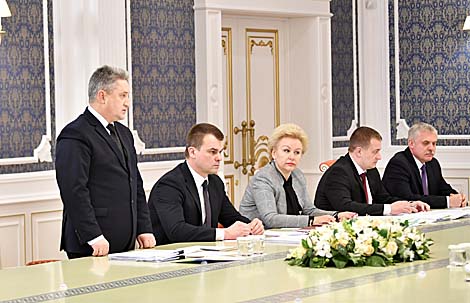Events
Experts opine on Belarus’ civil service bill

MINSK, 22 January (BelTA) – After a conceptual analysis of the new bill “On civil service”, Belarus President Alexander Lukashenko gave an instruction to fine-tune the document without any haste. Attending the discussion were, among others, representatives of the expert and academic communities, BelTA has learned.
The underlying idea of the bill is to approach civil service as a holistic system structured into several parts. “At present we have different regulations for military service, service in paramilitary formations and public service. This bill provides for a single system of civil service that incorporates all these types of service. This is the fundamental conceptual idea that will allow building up the legal framework for the entire civil service system,” Director of the National Center of Legislation and Legal Research Vadim Ipatov said.
In his words, the bill also envisages tighter discipline and accountability of civil servants. They will be entitled to certain benefits and guarantees commensurate with their scope of responsibility. The head of state drew attention to tougher punishment for corruption and lack of discipline.
“Before providing social guarantees and certain so-called benefits to civil servants, it is necessary to look into the discipline and the scope of responsibility of a civil servant. Therefore, a taskforce started from the development of major guidelines concerning service discipline and general ethical standards,” the director of the center remarked. “A regulation describing service discipline has been included in the bill for the first time. This is similar to army regulations.”
The bill will specify what kinds of ethical standards are applied to civil servants during and in between working hours. Besides, the bill will include a regulation concerning the behavior of civil servants in social networks, Vadim Ipatov added.
Vice-rector for academic affairs and education innovations of Belarusian State University, Doctor of Law, Professor Olga Chupris, in turn, said that the bill was prepared by the interagency taskforce including researchers and experts, and the majority of them are not civil servants. “They submitted many practical and theoretically-grounded proposals, scrutinized all recommendations of practitioners, analyzed foreign experience,” she said.
During the government session the president was also informed about a number of proposals of the taskforce. One of them pertains to rotational jobs. “At present rotation is possible with two kinds of jobs in Belarus. These are prosecution and diplomatic workers. However, we can consider this option in general in the system of public service. The head of state gave an instruction to consider this issue in the future. Looking at foreign practices, we can analyze rotational jobs,” Olga Chupris said.
The academic community suggested setting up an ad hoc body for civil service management. Such a body could be useful given the complex system of civil service. “Let it be small, compact but very professional. It would analyze the state of affairs in the civil service, even job descriptions, number of posts. There are many problems in civil service related to optimization, settlement of disputes connected with admission, dismissal, transfer to another job,” the expert said.
Olga Chupris also drew attention to qualifications exams. “Currently such exams are taken by civil servants in every department and agency. Perhaps it would make sense to put one authority in charge of these exams and to allow it to issue relevant certificates,” she said.
The task of the state is to have a clear structured civil service. But the most important thing is that civil service works for people. Hence the high requirements to civil servants and to civil service in terms of discipline, transparency, responsibility. On the other hand, civil servants are entitled to guarantees as they serve the society. Therefore, the ultimate aim is to match the interests of society, the state with those of civil servants,” Olga Chupris noted.







 print version
print version make home page
make home page add to bookmarks
add to bookmarks

